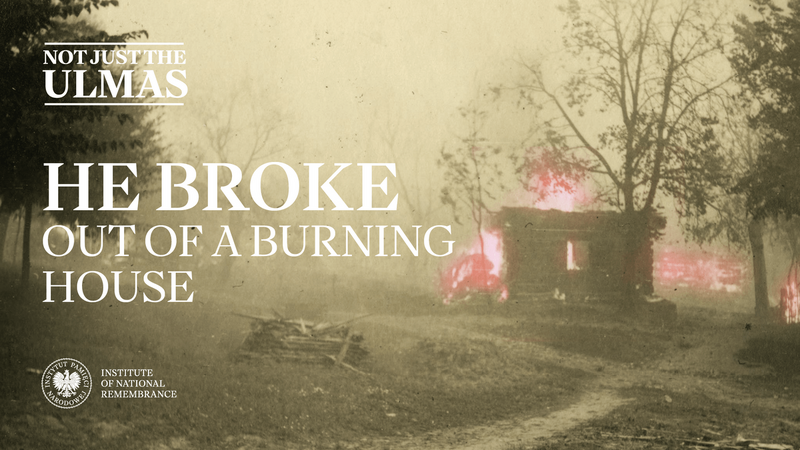We present the next episode of the series “Not only the Ulmas”. The film “He Broke out of a Burning House” depicts the story of the Lech family, poor farmers from the hamlet of Wólka near Chmielnik. For months they helped Jews hunted by the German occupier. Sometimes as many as twenty fugitives stayed on their farm. The Lechs miraculously survived the German manhunt and went into hiding until the end of the war. The gendarmes killed all the Jews and burned down the farm.
Watch previous episodes of the series "Not only about the Ulma's".
The feature by Tomasz Domański used in the film narrative about the Lech family can be found in the IPN publication: Represje za pomoc Żydom na okupowanych ziemiach polskich [Repression for helping Jews on occupied Polish lands during World War II], vol. I, ed. M. Grądzka-Rejak, A. Namysło, Warsaw 2019, p. 213.
During the Second World War, the four-member family of Franciszek Lech, consisting of the father, his wife Katarzyna, his daughter and his son Jan, lived in the hamlet of Wólka near the village of Gołuchów in the municipality of Chmielnik, Kreis Busko, in the Radom district, where they owned a small farm of about two hectares. It was located off the beaten track, at the edge of the forest.
Jewish refugees began to ask the Lechs for help at the end of 1942. A year later, after the murderous repression of the Polish elites, the Germans focused on the complete extermination of people of Jewish descent. They referred to it as “Aktion Reinhardt” or the truly satanic term “Final Solution to the Jewish Question” (Endlösung der Judenfrage).
For many months, the Lech family provided help to a group of Jews who escaped from ghettos and Jewish settlements such as Chmielnik, Kije and Piotrkowice, which were destroyed by the German occupation authorities. The Jews staying with the Lechs were also helped by the inhabitants of nearby villages, and some, such as the Boberek and Kaszuba families, also provided shelter to Jews. Among those rescued by the Lechs were, among others: Wiśliński with his wife and children, Markowiecki with his two sons, and Szmul Fisz. From time to time, Szulim Markowicki’s family came to the Lechs, stayed for a few days and then left. Jews from Jędrzejów also hid at the Lech family for several days. There were usually a few to a dozen or so Jews taking shelter on the farm at one time, but sometimes even more than twenty. At some point, the Germans found out about the presence of Jews at the Lech family.
It is to Poles like the Lech family that we can apply the words spoken by a Holocaust survivor to Yad Vashem: I, Zygmunt Warszawer, do not list any of the Poles, who helped me survive. I jumped out of the train heading to Treblinka for incineration, the train where my child was asphyxiated. I reached the Pielaczka household, which sheltered me for four days, and then walked from village to village: Kornacice, Gończyce, Leokadia, Sośninki, Łaskarzew, Izdebko as well as Zygmunty and Romanów. All of these people helped me. I nominate no one for an award because America would be bankrupt. Every day I was at someone else’s mercy (quote from: Jan Żaryn, Polska wobec Zagłady [Poland in the face of the Holocaust], Oficyna Wydawnicza Volumen, Warsaw 2019, p. 7).
Most of the thousands of people who helped Jews during the German occupation have never been honoured and will most likely never be publicly known. We want to commemorate them all with a series of films “Not only the Ulmas”. We invite you to watch the 14th episode of the IPN film miniatures from the “Not only the Ulmas” series dedicated to the Lech family – “He Broke out of a Burning House” which we present in Polish and English versions on the IPNtv channel and on social media.
***
Researchers estimate that during the Second World War the Germans murdered approximately a thousand Poles for aiding Jews. Thanks to the heroic deeds of many inhabitants of the occupied Polish lands, several dozen thousand Polish citizens of Jewish descent were saved.
***
We invite you to use the IPN publications:
- Represje za pomoc Żydom na okupowanych ziemiach polskich w czasie II wojny światowej [Repression for helping Jews on occupied Polish lands during World War II]
- Co widziały drzewa [What the Trees Saw] - An animated film about the blessed Ulma family
- Exhibition “Poles who rescued Jews during World War II”
- Poles saving Jews under German occupation – infographics
